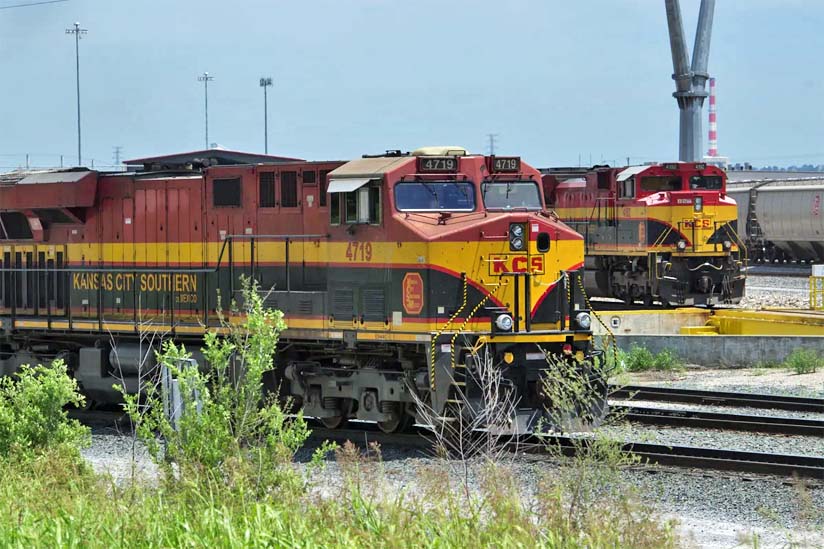
North America - U.S. regulators approved a railway takeover last week in part on environmental grounds, the deal gets trucks off
New England highways, perhaps paving the way for approval of Canadian Pacific Railway Ltd.'s (CP) blockbuster acquisition of Kansas City Southern
(KCS) later this year.
In a decision that shows government agencies continue to look beyond competition issues when vetting major takeovers, rail regulators at the Surface
Transportation Board (STB), signed off last Thursday on CSX Corp.'s purchase of Pan Am Railways Inc.
Massachusetts-based Pan Am runs a 2,900 kilometre network across the northeastern U.S. and into New Brunswick, where it links up with New Brunswick
Maine (NBM) Railways, owned by the Irving family.
The STB, which froze mergers between major, Class 1 North American railways for the past decade on concerns that consolidation would lessen
competition, gave a green light to the CSX takeover for two reasons.
First, the agency said the deal delivers more efficient transportation for customers such as farmers, automakers, and lumber companies.
Second, the STB said the acquisition will cut fossil-fuel consumption by shifting freight to rail from trucks.
Trains, on average, are three to four times more fuel efficient than long distance trucks, according to the Railway Association of
Canada.
In approving the CSX acquisition, the STB said, "Any anti-competitive effects that might be caused by the transaction, in the unlikely event
they were to occur, would be outweighed by the public interest in meeting significant transportation needs."
STB approved the deal as it reviews CP's proposed US$27.2 billion takeover of KCS, a merger that would create 20,000 kilometres of track linking
Mexico and the southern U.S. to both Canadian coasts.
In a report on Monday, analyst Walter Spracklin at RBC Capital Markets said the STB decision has "positive implications for CP with regards to
its proposed acquisition of KCS."
Last December, CP put shares of the U.S. railway into a trust, pending a STB ruling the two companies predicted will come by the end of this
year.
The two companies can't be integrated until the regulator gives its blessing.
If the STB were to rule against the takeover, CP would be forced to somehow dispose of KCS.
Against a backdrop of U.S. President Joe Biden's push to combat climate change, analysts say the regulator's decision to highlight the green elements
of the CSX takeover marks a shift in the landscape.
Mr. Spracklin said 1.5 million trucks travel annually from Mexico north into the Midwest and surrounding regions.
"If CP is able to convert even a small percentage of this traffic, the environmental impact would be significant, and in our view a key
consideration in the STB's decision," he said.
In a filing last year with the STB, CP said merging with KCS will divert more than 60,000 truck shipments to rail each year.
The railway said that would avoid over 65,000 tonnes of greenhouse gas emissions annually, or more than 1.3 million tonnes over 20 years.
In the past, regulators such as the STB and the Competition Bureau in Canada reviewed takeovers almost entirely though a lens of what the deals
meant for price competition.
In Canada, the approach changed in 1986, when the federal government ruled transactions could go forward if the economic efficiencies they create
outweigh the anti-competitive impact.
That shift meant a number of domestic deals ended up closing despite objections from the competition watchdog.
Companies pitching mergers in mature industries now tout the positive social benefits of their deals to counter concerns over diminished
competition.
Last year, for example, Rogers Communications Inc. pledged to expand 5G wireless networks and high-speed internet services for rural and
indigenous communities in Western Canada when it unveiled a $26 billion acquisition of Shaw Communications Inc.
The moves were meant to blunt concerns over losing one of four national cellphone providers.
Regulators and politicians are expected to complete their review of Rogers' bid by June, well before the federal Liberals get rolling on a recently
announced review of domestic competition regulations.
Now a major U.S. regulator is adding environmental considerations to the takeover approval process, as CP chief executive officer Keith Creel
attempts to justify merging two of just seven Class 1 North American railways.
If Mr. Creel can convince the STB that joining forces with a rival will take 18 wheel rigs off U.S. highways and help slow climate change, he's
likely to win approval for the first major rail takeover in more than a decade.
Andrew Willis.
(there was no image with original article)
(usually because it's been seen before)
provisions in Section 29 of the Canadian
Copyright Modernization Act.
